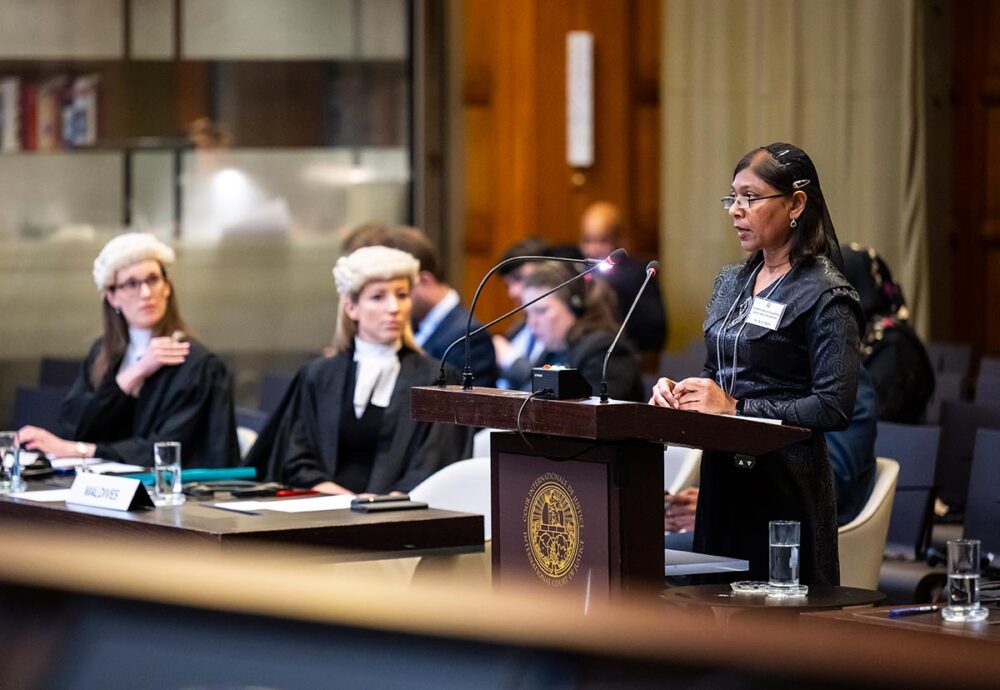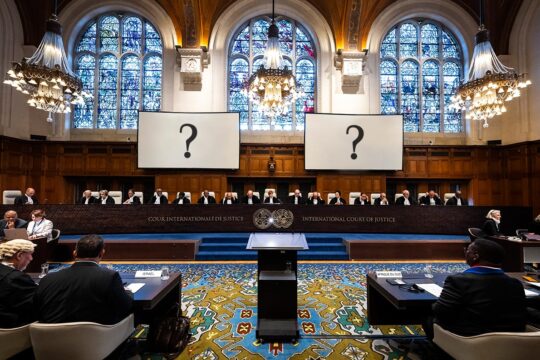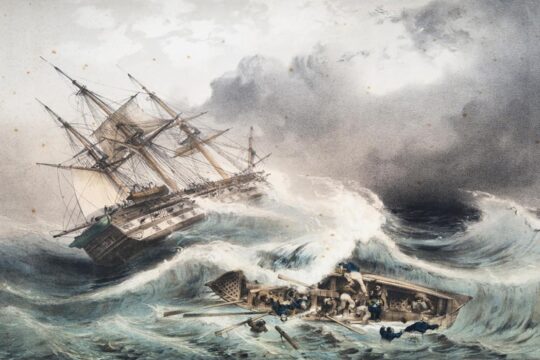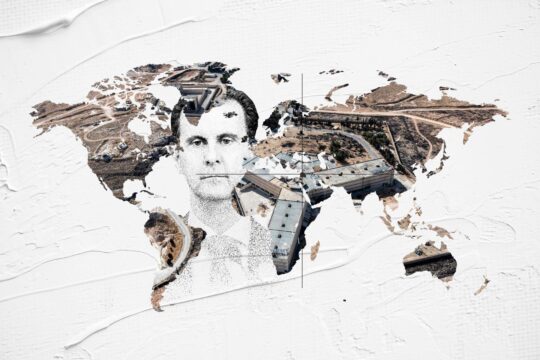“What does international law mean for Palestinian children in Gaza today? It has protected neither them, nor their childhood. It has not protected their families or communities. It has not protected their lives or limbs, their hopes or homes.” Permanent Representative of the State of Palestine to the United Nations Riyad Mansour was fighting back the tears when he addressed the judges of the International Court of Justice in The Hague in February. He complained that “for Palestine, the law continues to be only a measure of the severity of breaches, rather than a catalyst for action and accountability.”
For a week after Mansour’s address to the court, 50 other states and international bodies - the highest number of interventions at the ICJ - followed up with their interpretations of the United Nations General Assembly request for an advisory opinion on the legality of Israel’s occupation of the Palestinian territories. Ottilia Anna Maunganidze of South Africa’s Institute for Security Studies counted up all the submissions, both oral and written on the issue; in total, 63 states and international organisations weighed in. She notes this is a considerable increase on the 45 who intervened 10 years ago when the court was last asked its opinion on the Israeli-Palestinian context – which resulted in the judges’ opinion that Israeli settlements are illegal.
A space with equal footing
The last state to present during the February 2024 hearings was the tiny island of the Maldives with a population of just over 500,000. They had the same amount of time as, for example, China and the USA. “The power of a small country like the Maldives presenting arguments at the ICJ” says Maunganidze, in a space where it “could be seen not only as a small country but lacking political weight”, is their “equal footing.”
Famously, Lennart Meri, president of Estonia in the late 1990’s, suggested that “the nuclear weapon of small states is international law.” The numbers of states involved and the multiplicity of ways that states are now approaching the ICJ – including South Africa’s current genocide case against Israel, and Ukraine’s genocide case against Russia, along with the General Assembly request for the advisory opinion – suggests “something has shifted,” says Heidi Matthews of York University, Toronto. “If you look at where these requests for the court's attention are coming from we see states from – let's call it the Global South – who just like South Africa in the genocide case, are really pressing on the levers available to them in international law to get up on the world stage.” Maunganidze concurs: “I do think the value of the International Court of Justice is that states, regardless of their size, are able to intervene.”
Against the backdrop of a lack of negotiated progress on the conflict between Israel and Palestine within the framework of a two-state solution, there was “a very strong desire on the part of the UN General Assembly to clearly put that question on the agenda using the ICJ,” notes Matthews. “It was an interruption of the status quo approach, politically, to the question of Palestine.”
International law is part of a state’s toolbox, says Iryna Marchuk of Copenhagen University, “one of the avenues that Ukraine pursued, because to achieve accountability, you have to explore all options. It does seem that there is this growing understanding that we should be using the international instruments that we have.” Partly that’s because it's not easy, she says, to create a new international instrument like the Comprehensive Terrorism Convention or the Convention on crimes against humanity, neither of which has yet become a reality.
Not an activist court
As the principal judicial body of the UN, the ICJ’s “job is to be highly formalistic, highly positivistic in the way that it interprets law. And that's never going to change,” says Matthews. “But if we read between the lines, politics is obviously always present. It’s part of the role of the ICJ, especially in its advisory capacity, to assist the work of the UN General Assembly, which is fundamentally political. But to do so in accordance with international law.”
Marchuk describes herself as an international criminal law person who has reluctantly become an ICJ expert. ”It's interesting how states came to instrumentalize the International Court of Justice, because they want this to be the platform for their grievances to be heard.” But she recognises that it remains a conservative court: Ukraine is still smarting from the way the court downsized and rejected its applications against Russia under a variety of international conventions. “Everyone knows that ICJ is a conservative body, and it's not a secret that it adopts some kind of avoidance techniques,” she says. “The court often says: ‘There are many issues at stake here, but our jurisdiction is limited. We will narrowly address this and this violation’. So it's not an activist court,” she concludes.
According to Marchuk this is partly because if the court’s judgements were not obeyed, it would reflect badly on its legitimacy. But, she says: “I find that right now the ICJ has to step out of its comfort zone. It cannot always hide behind this avoidance technique and say ‘oh, we are not able to address this question because it falls outside our jurisdiction’. They cannot always, you know, reframe the question or refuse to ask the question or answer by a minimum. Because otherwise, no one will go to the ICJ anymore and it will be dismissed as the court that is not capable of dealing with major international issues, and not able to uphold the major principles in the UN Charter. So I think that we are in this moment where the ICJ has to reinvent itself. For it to deliver meaningful justice.”
The power of the Genocide Convention
One of the repeated themes in many of the states’ interventions in the recent Palestine hearings was that states have rights and responsibilities that they have automatically signed up to and which have strong consequences in international law. “States are actually legally obliged to ensure that the norms are followed by other states,” says Matthews. “We saw many of the states in their oral statements at the court really focusing on the right of people's self-determination.”
Looking back at the high number of state interventions supporting Ukraine’s cases at the International Court of Justice Marchuk suggests that there can also be a bit of peer pressure. Copenhagen was among those who condemned Russia’s full-scale invasion of Ukraine: “It would be awkward, even for such a small country as Denmark, to support Ukraine in different international fora and then not to [intervene at the ICJ] knowing that more than 30 states actually did that.”
The legal obligations that states take on are particularly strongly illustrated in the Genocide Convention which has come to the fore not only with the South Africa case against Israel, but also the Gambia case against Myanmar. The way the convention is worded “offers any state in the world who is a party to the convention, to be able to bring a claim against another state for violation of the convention, or a dispute around the interpretation of the convention,” says Matthews. It “provides a fairly easy mechanism, a certain access on the part of third states to the court,” she continues. “That's one reason why the Genocide Convention is coming up over and over again.”
At the beginning on March, Nicaragua illustrated again how the treaty can provide surprising opportunities with an attempt to accuse Germany of failing in its obligations in relation to supporting Israel during the current conflict.
Tempering expectations
While Maunganidze agrees that states “do view the ICJ as an important forum” she wants to “caution against assuming that this is something new.” States have regularly resorted to the court since its establishment, she says. Matthews admits to “a bit of an excited sense” with the current flurry of attention on the court. “We should be careful to temper our expectations of what the court can deliver, especially in moments of very serious, and very active, ongoing conflicts. That's true both of the war in Gaza and of the situation in Ukraine. We need to be careful how much we expect from institutions of international law in general and the ICJ in particular,” she warns.
Pointing to the recent provisional measures ordered by the court in the Gaza situation, Marchuk says “it's very clear that we need concerted political will and pressure in order, even for those binding decisions and judgements, to have any kind of effect on the ground.” Looking back at the provisional measures in the Ukraine situation when in March 2022 the court ordered Russia to stop its invasion brings a rather sobering account of the power of such orders.
However, says Maunganidze, “in a time when there's a lot of walking away or scaling back on the gains of democracy, I do think countries using judicial mechanisms means the rule of law is still something that countries respect. Even if they disagree fundamentally on the substance that they're discussing, they still take part in a non-aggressive manner.”








